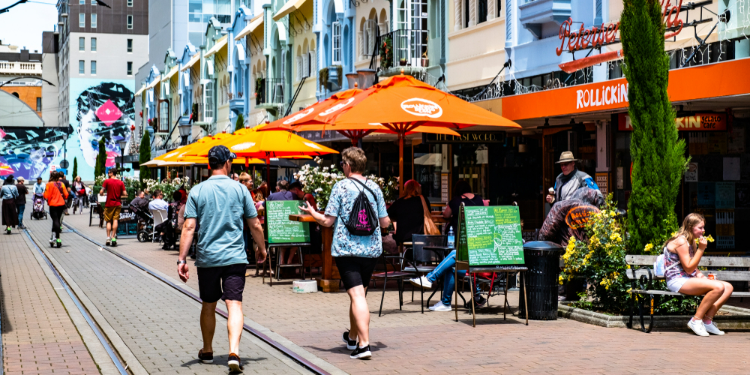
New Zealand has recently increased the number of working holiday visas for the year 2022/2023 as a temporary measure to deal with its skills and labor shortage. Since Covid, some sectors like tourism and construction have struggled to recover their workforce. An additional 12,000 working holiday visas will allow foreigners to fill the labor gap in these sectors, at least in the short term. The terms of the Accredited Employer Work Visa have also been relaxed to attract foreign labor.
What is the Working Holiday Scheme?
The Working Holiday Scheme provides the opportunity for young people to gain work experience abroad and discover a new country. According to the website of New Zealand Immigration, young adults between 18 and 30, or between 18 and 35 for some countries, can get a 12-month visa to work in the country.
New Zealand has agreements with 45 countries for the Working Holiday Scheme. They include China, Taiwan, Vietnam, Singapore, Israel, Turkey, Peru, Uruguay, Mexico, Portugal, Norway, the Netherlands, Croatia, Poland and the US, among others. Applicants from the UK and Canada can enjoy a longer 23-month visa under their countries' agreement with New Zealand.
These young people can also follow short courses during their stay, such as English language classes, as well as volunteer. World Wide Opportunities on Organic Farms (WWOOF), for example, provides great homestay experiences on organic farms to volunteers. Participants cannot, however, accept a permanent job offer while on this visa. They should also be able to cover their flight costs and cost of living during the stay, as the scheme isn't financially subsidized by the New Zealand government.
For 2022/2023, the Working Holiday Scheme cap will allow for 12,000 extra visas. In addition, foreigners whose working holiday visas will expire between 26 August 2022 and 31 May 2023 will be granted a 6-month extension. The Minister of Immigration, Michael Wood, has also announced that the deadline by which these visa holders must enter New Zealand has been extended from September 2022 to January 2023. This will give more flexibility to those who've struggled to book flights. Indeed, thousands who already hold the visa haven't been able to travel yet because of the scarcity of flights, higher-than-normal airfares, and other Covid-related issues.
Labor shortages and temporary workers in New Zealand
Unemployment in New Zealand currently stands at a historic low of 3.3%. And yet, some sectors are still struggling to find workers. These were sectors that many workers left during the pandemic: tourism, hospitality, care for the elderly, seafood, construction and meat processing.
In Auckland, some restaurants have even introduced robots to help with table service because they are struggling to recruit waiters. Indeed, death rates for many workers in these aforementioned fields (e.g., construction laborers, line cooks) were high worldwide during the pandemic. The nature of their jobs and their labor conditions made it harder to maintain social distancing. In New Zealand, closed borders exacerbated this crisis by making the entry of foreign workers impossible throughout most of 2021.
Tourism is one particularly badly hit sector. A survey of Tourism Industry Aotearoa shows that three-quarters of tourism businesses have vacancies for various positions, such as adventure tourism guides, marketers, operation managers and bike mechanics. However, 59% of these positions are getting less than five applications.
These labor shortages are aggravating inflation. In August, the Reserve Bank of New Zealand, in its seventh straight hike, raised the official cash rate by 50 points to 3%. This measure to rein in inflation will have limited success if the labor shortage is not solved. This is why the crux of the matter, in the words of Immigration Minister Michael Wood, concerns “providing immediate relief” to the private sector, which can be done through the introduction of more foreign workers in the very immediate future.
Wood admits that “overreliance” on working holidaymakers in the past had created a toxic labor market where these workers were underpaid. But he thinks that this time around, they can get “the balance right.”
Sector agreements
Sectors most affected by labor shortages have also been granted exemptions by the New Zealand government that will allow them to “unlock additional labor.” This includes limited exemption on the median wage requirement (27.76 NZD per hour) to obtain an Accredited Employer Work Visa (AEWV) for a foreign worker. It should be noted that this is a different visa from the Working Holiday Visa.
This way, jobs facing shortages in tourism, hospitality and construction must pay a foreign worker only a minimum of 25 NZD per hour. Certain jobs in the care sector, especially care of the elderly, must pay foreigners at least 25.39 NZD per hour. In the meat and seafood processing sectors, the limited exemption stands at 24 NZD per hour. For sea-based roles, the workers must have a Foreign Fishing Crew visa and be paid the minimum wage (21.20 NZD) plus 4 NZD.
The aforementioned wage thresholds will be increased every year according to the change in the median wage. Foreigner workers with an AEWV can be paid under the median wage for two years. After two years, they need to spend 12 months outside of New Zealand before being eligible to apply for another AEWV paid below the median wage. However, if they get another job paid above the median wage, they don't have to wait a year.



















